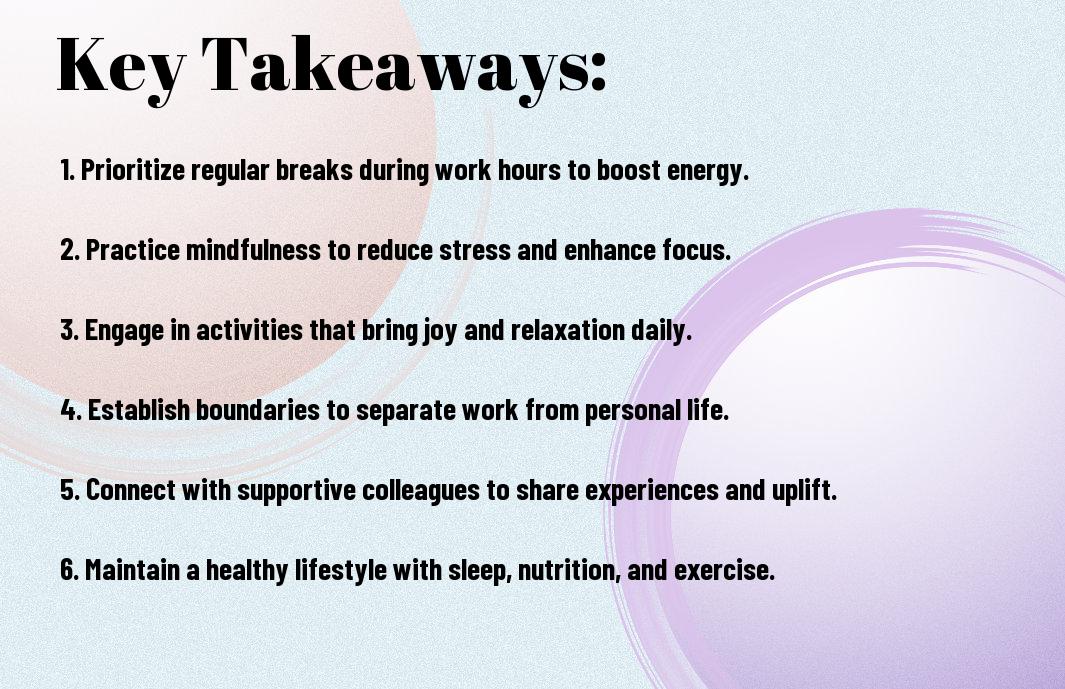It’s vital to prioritize your emotional well-being in today’s fast-paced world. Recharging your emotional energy can lead to improved productivity, better relationships, and overall happiness. In this post, you’ll discover practical strategies tailored to help you manage stress, enhance your resilience, and unlock your full potential. By implementing these techniques, you will not only feel more energized but also cultivate a more positive mindset. Let’s explore how you can effectively refresh your emotional reserves.
Key Takeaways:
- Implement regular breaks throughout the workday to enhance focus and reduce burnout.
- Engage in mindfulness practices, such as meditation or deep-breathing exercises, to help manage stress and improve emotional resilience.
- Build a supportive workplace culture by fostering open communication and team collaboration, which can contribute to overall emotional well-being.

The Emotional Energy Drain: Identifying Triggers
Recognizing what drains your emotional energy is the first step in reclaiming it. Everyday stressors like unrealistic deadlines, conflict with colleagues, and lack of recognition can contribute significantly to your emotional fatigue. You might find yourself feeling overwhelmed not only by your workload but also by the interpersonal dynamics within your team. By pinpointing these triggers, you can take proactive steps to mitigate their impact and create a more balanced work environment.
Common Stressors in the Workplace
A multitude of factors can serve as stressors in your workplace, ranging from high-pressure expectations to ambiguous job roles. Overloaded schedules often lead to feeling stretched too thin, while a lack of management support can enhance feelings of frustration. Additionally, ineffective communication and unclear team goals create confusion, which can further drain your emotional energy and productivity.
The Impact of Emotional Exhaustion on Performance
Emotional exhaustion significantly hampers your overall performance at work. You may realize that lack of enthusiasm hinders creativity and innovation, diminishing your quality of work. Moreover, tasks you once tackled with ease can become daunting when you’re emotionally depleted, resulting in time-consuming mistakes and decreased efficiency. A study by the World Health Organization highlights that emotionally exhausted employees are 63% more likely to experience performance issues compared to their energized counterparts, illustrating the importance of addressing emotional health proactively.

Balancing Act: Strategies for Emotional Recharge
Embedding emotional recharge strategies into your daily routine is imperative for maintaining balance. Engaging in small yet impactful practices can positively influence your emotional resilience. Explore methods to optimize your workspace, such as incorporating natural light or greenery, and get inspired by insights on How to Protect Your Energy at Work. These strategies can prevent overwhelm and foster a supportive environment that nurtures your emotional health.
Mindfulness Techniques for Daily Resilience
Integrating mindfulness techniques into your routine helps cultivate resilience. Simple practices like daily meditation, conscious breathing, or savoring a moment during your lunch break can ground you in the present. Establishing a habit of mindfulness fosters emotional awareness, allowing you to recognize and respond to stressors rather than react impulsively. These techniques not only enhance your mental clarity but also improve your overall emotional well-being.
Short Breaks vs. Long Vacations: What Science Says
Research underscores that taking short breaks throughout your workday can significantly boost productivity and emotional well-being, often more than a long vacation. Frequent, brief pauses can recharge your focus, while longer time off may leave you with a slower return to routine. Balancing both short and long breaks is imperative for maintaining engagement levels without experiencing burnout, making it vital to tailor your approach based on your unique needs.
Understanding the impact of short breaks versus long vacations can influence how you manage your emotional energy. Studies indicate that individuals who take regular, targeted breaks—lasting just a few minutes—experience heightened levels of productivity and creativity, often outperforming those who rely solely on longer vacation breaks to recuperate. These rejuvenating micro-breaks allow you to reset mentally, enabling you to dive back into tasks with renewed focus and clarity. Prioritize short breaks to enhance your daily emotional resilience while still planning for longer time off to recharge thoroughly when needed.
Social Connections: The Power of Positive Relationships
Strong social connections are fundamental to your emotional well-being. Engaging in positive relationships at work not only boosts your mood but also enhances productivity and collaboration. Research indicates that individuals with supportive coworkers report significantly lower levels of stress and burnout. These relationships create an environment where you feel valued, fostering a sense of belonging that can recharge your emotional energy and contribute to overall job satisfaction.
Building a Supportive Network at Work
Cultivating a network of supportive colleagues is imperative. Take the time to initiate conversations, share personal experiences, and show genuine interest in your coworkers’ lives. Participating in team-building activities, both formal and informal, lays down the foundation for trust and connection. By consistently fostering these relationships, you create an supportive environment where everyone can thrive and uplift each other’s spirits.
The Role of Mentorship in Emotional Well-being
A strong mentor can serve as a significant source of emotional support. Effective mentorship allows for guidance and offers a safe space for discussion about workplace challenges. These relationships can provide perspective and insight, enhancing your resilience against stressors that may otherwise drain your emotional energy.
Engaging with a mentor can dramatically impact your emotional health. A study from the Workplace Mentoring Association found that individuals with mentors experience a 25% increase in job satisfaction. Mentorship not only offers advice on navigating workplace dynamics but also fosters a sense of accountability and encouragement. This relationship can help you set goals and reflect on your personal growth, leading to greater emotional stability and fostering an environment of trust and collaboration in your workplace.
Proactive Practices: Creating Your Emotional Wellness Plan
Developing a personalized emotional wellness plan empowers you to take charge of your emotional health. Consider incorporating strategies that resonate with your unique experiences and lifestyle. Setting specific goals around self-care, social engagement, and stress management can provide the structure necessary to navigate daily challenges effectively. By proactively integrating these practices into your routine, you foster resilience and create a more balanced emotional life.
Daily Habits to Sustain Emotional Energy
Establishing daily habits is key to sustaining your emotional energy over time. Simple practices like mindfulness meditation for just 10 minutes each morning, or dedicating time for physical activity, can significantly enhance your mood and overall mental clarity. Incorporate gratitude journaling into your evening routine to reflect positively on your day, helping you to end on an uplifting note.
Setting Boundaries to Protect Emotional Space
Creating boundaries is vital for preserving your emotional space. This means saying no to commitments that overextend you or drain your energy. Taking control of your time and emotional commitments allows you to focus on relationships and activities that truly enrich your life.
Establishing boundaries can empower you and prevent burnout. For example, designating specific times when you are available for work and personal matters helps maintain a work-life balance. You might inform colleagues of your limits by setting “do not disturb” periods or opting for silent notifications on your devices. As you practice these boundaries, ensure you communicate your needs openly with others to foster understanding and respect. This way, you can protect your emotional energy, allowing space for rejuvenating self-care and fulfilling connections.
The Future of Work: Trends in Emotional Health Awareness
The landscape of work is evolving, with a pronounced shift towards prioritizing emotional health and well-being. Companies now recognize that fostering a supportive atmosphere is important for enhancing productivity, reducing absenteeism, and improving overall employee satisfaction. As organizations begin to view emotional health as a business imperative, innovative strategies and resources will emerge to further integrate well-being practices into the normal workflow, ensuring that the workforce remains engaged and energized.
Organizational Shifts Towards Mental Well-being
Organizations are increasingly implementing policies that prioritize mental well-being, creating employee support programs, and promoting a culture of open communication about emotional health. These shifts often include regular mental health days, access to counselling services, and training managers to recognize signs of emotional distress. As employees notice a genuine commitment to their well-being, they are likely to feel more connected and valued within the workplace.
The Importance of Employee Feedback and Adaptation
Soliciting employee feedback on mental health initiatives allows organizations to tailor their approaches to meet specific needs and preferences. By actively engaging staff in this dialogue, you can identify areas of improvement, ensuring that resources resonate with the workforce. For example, companies like Microsoft have incorporated regular surveys to gauge employee sentiment, adapting wellness programs based on direct input. This commitment to continual adaptation enhances the effectiveness of initiatives, fostering a more resilient workforce that feels heard and supported.
Incorporating employee feedback into your organization’s mental health strategy promotes a cycle of trust and improvement. When employees see their suggestions implemented, it reinforces their value within the company and increases their likelihood of utilizing available resources. For instance, an increase in flexible work options can emerge from feedback specifically highlighting the importance of balance. This adaptability not only boosts morale but also solidifies your organization’s reputation as a pioneer in emotional well-being practices, attracting top talent in the competitive job market.
Final Words
Considering all points, integrating the strategies outlined in WorkWell can significantly enhance your emotional energy and overall well-being. By prioritizing self-care, setting boundaries, and engaging in mindfulness practices, you empower yourself to navigate life’s challenges with resilience. This proactive approach not only improves your productivity but also fosters a healthier work-life balance, ultimately leading to a more fulfilling and energized life. Embrace these strategies in your daily routine to cultivate a more positive emotional state, paving the way for personal and professional success.
FAQ
Q: What are some effective strategies to recharge emotional energy while at work?
A: There are several strategies to help recharge emotional energy during the workday. One effective approach is to take short breaks throughout the day, even if they are just a few minutes long. Use this time to step outside for fresh air, do some light stretching, or practice deep breathing exercises. Another strategy is to engage in brief conversations with colleagues that are light-hearted or unrelated to work. This can foster a sense of connection and allow for emotional relief. Additionally, incorporating activities that bring joy or relaxation, such as listening to music or practicing mindfulness, can greatly enhance your emotional state and help you feel rejuvenated.
Q: How can I create a workplace environment that supports emotional energy recharging?
A: Creating a workplace environment that supports the recharging of emotional energy involves fostering a culture of open communication and inclusivity. This can be achieved by encouraging team members to share their thoughts and emotions, which can build a supportive atmosphere. Additionally, consider implementing flexible work schedules and providing spaces for relaxation, such as quiet rooms or common areas with comfortable seating. Incorporating regular team-building activities or wellness programs can also help to create a cohesive work environment where employees feel valued and energized. Providing resources related to mental well-being can further demonstrate the organization’s commitment to emotional health.
Q: What role does self-care play in maintaining emotional energy at work?
A: Self-care plays a significant role in maintaining emotional energy at work. By prioritizing self-care practices such as getting enough sleep, eating nourishing foods, and engaging in regular physical activity, individuals can enhance their overall emotional resilience. This, in turn, allows for better focus, productivity, and collaboration during work hours. Also, integrating hobbies and relaxation techniques outside of work can help individuals recharge and bring positivity into their work environment. It’s important for each person to identify what self-care strategies work best for them and to make these a regular part of their routine to ensure ongoing emotional well-being.

Leave a Reply